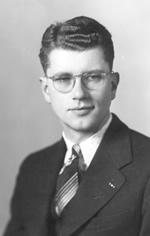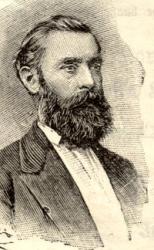Planning worship?
Check out our sister site, ZeteoSearch.org,
for 20+ additional resources related to your search.
- |
User Links
Person Results
Henry A. Bruinsma

1916 - 1991 Topics: Danger of Delay Arranger of "THIRSTING" in Trinity Hymnal (Rev. ed.) It was in Bruinsma's musical compositions that his brilliance was most displayed. “Henry’s personality was … embodied in his music: colorful, radiating charisma, magnetic in a nonverbal way,” niece Jane DeGroot said.
Bruinsma displayed musical potential even before he was considered old enough to take music lessons, said his wife, Grace Hekman Bruinsma. The preschooler would eavesdrop on his older brother’s piano lessons. After the teacher left, Bruinsma would climb onto the piano bench to practice his brother’s lesson assignment. Later on, he chose to attend Ottawa Hills High School in Grand Rapids, Mich., for its music program.
Following high school graduation in 1933, Bruinsma attended the University of Michigan for a degree in music. He stayed on to complete a Ph.D. in musicology, becoming the first musicologist to graduate from the University of Michigan. It was during his graduate work that Bruinsma wrote Scherzo on a Dutch Nursery Song. “He never lost his love for Dutch history or Dutch Reformed music,” Grace Bruinsma said.
It was also during his time at U of M that Bruinsma began taking Grace to music concerts, and in 1939 they were married.
Bruinsma began his time as a professor of music at Calvin College (1946-55). In addition to his teaching duties at the college, Bruinsma taught the first music and theology course at Calvin Seminary. He also chaired the first Conference on Liturgy of Music.
However, not long after his time at Calvin, Bruinsma decided he was being called to move from teaching to education administration. Of note is his time at Ohio State University (1959-64), where he served as the director of the School of Music. He also held the position of executive committee member of the College of Education.
Next, Bruinsma moved to what is now Arizona State University (1964-79), another notable mark in his education administration career. During that time, he served first as chair of the School of Music, then as founding dean of the College of Fine Arts. He is also known to have started the first religious studies program at Arizona State as part of the university’s interdisciplinary studies program.
Due to the amount of time he spent in education administration, much of Bruinsma’s musical compositions were never published. After his death, Grace Bruinsma contacted Gerry Bouma of Morningside College in Sioux City, Iowa. Bouma and Henry Bruinsma had met in 1969 at a Grand Rapids Christian High School concert in Chicago. “For whatever reason, Henry and Grace treated us like we were their kids,” Bouma said. Grace asked Bouma to catalog and publish the 10,000 pages of Henry’s material. Taking a semester sabbatical, Bouma began his work.
Bouma’s catalog of Bruinsma’s work can be found in the Heritage Hall Archives at the Hekman Library, Calvin College. The Archives also hosts additional works from Bruinsma’s time at Calvin.
--Excerpted from Calvin Spark, Spring 2006 issue
Henry A. Bruinsma
E. C. Hoff

1832 - 1894 Person Name: Erik. K. Hoff, b. 1832 Topics: Danger of Delay Composer of "RESIGNATION" in Christian Hymns Born: January 21, 1832, Bergen, Norway.
Died: December 8, 1894.
A graduate of the Stord seminary, Hoff sang in the Korskirken choir in Bergen, and studied organ and music theory in Vogel. In 1860, he moved to Halmestrand, where he taught two years before taking another teaching post in Oslo. He conducted several choirs in Oslo, and became organist at the Garisonkirke in 1864. King Oscar frequently went to the Garisonkirke to hear Hoff play, and encouraged him to produce a chorale book. Hoff’s works include:
Hoffs Melodibog, 1878 (contained 265 tunes)
--www.hymntime.com/tch
E. C. Hoff
Robert Edwards
1797 - 1862 Topics: Danger of Delay Composer of "CAERSALEM" in Trinity Hymnal
Robert Edwards
Simao Portogallo
Person Name: M. Portogallo Topics: Danger of Delay Composer of "ADESTE FIDELES" in Christian Hymns
Simao Portogallo
Jakob Hintze
1622 - 1702 Topics: Danger of Delay Composer of "SALZBURG " in Trinity Psalter Hymnal Partly as a result of the Thirty Years' War and partly to further his musical education, Jakob Hintze (b. Bernau, Germany, 1622; d. Berlin, Germany, 1702) traveled widely as a youth, including trips to Sweden and Lithuania. In 1659 he settled in Berlin, where he served as court musician to the Elector of Brandenburg from 1666 to 1695. Hintze is known mainly for his editing of the later editions of Johann Crüger's Praxis Pietatis Melica, to which he contributed some sixty-five of his original tunes.
Bert Polman
Jakob Hintze
Anne Ortlund
b. 1923 Topics: Danger of Delay Author of "Macedonia" in Trinity Hymnal (Rev. ed.)
Anne Ortlund
Ludvig Mathias Lindeman

1812 - 1887 Person Name: L. M. Lindeman (1812-87.) Topics: Danger of Delay Composer of "LONGING FOR HEAVEN" in Christian Hymns Ludvig M. Lindeman (b. 1812; d. 1887) was a Norwegian composer and organist. Born in Trondheim, he studied theology in Oslo where he remained the rest of his life. In 1839 he succeeded his brother as the organist and cantor of Oslo Cathedral, a position he held for 48 years up until his death. Lindeman was appointed Knight of the Royal Norwegian Order of St. Olav, and was invited to both help christen the new organ in Royal Albert Hall in London, as well as compose for the coronation of King Oscar II and Queen Sophie of Sweden. In 1883, he and his son started the Organist School in Oslo. Lindeman is perhaps best known for his arrangements of Norwegiam folk tales; over the course of his life he collected over 3000 folk melodies and tunes.
Laura de Jong
Ludvig Mathias Lindeman
Thomas Scott
1705 - 1775 Topics: Delay Danger of Author of "Hasten, O sinner, to be wise" in Book of Worship with Hymns and Tunes Thomas Scott was born at Norwich, and was the son of a Dissenting minister. After his education he began his ministerial life at Wartmell, in Norfolk, adding also the labours of school-teaching. Subsequently he changed his pastoral relations several times, spending the last years of his life at Hupton, in Norfolk, where he died in 1776. He was the author of some prose works, several poems, and a few hymns.
--Annotations of the Hymnal, Charles Hutchins, M.A., 1872
============================
Scott, Thomas, son of Thomas Scott, Independent Minister at Norwich, brother of Elizabeth Scott, and nephew of Dr. Daniel Scott, was born at Norwich, 1705. As a young man he kept a school at Wortwell, and preached once a month at Harleston, Norfolk. Then, after a short ministry at Lowestoft, he removed in 1734 to Ipswich as co-pastor with Mr. Baxter of the Presbyterian congregation meeting in St. Nicholas Street Chapel. On the death of his senior in 1740 he became sole pastor. In 1774 he retired to Hapton, and died there in 1775. He was the author of various poetical works, including:— (1) The Table of Cebes; or, the Picture of Human Life, in English Verse, with Notes, 1754; (2) The Book of Job, in English Verse; translated from the original Hebrew, with Remarks, Historical, Critical, and Explanatory, 1771; 2nd ed. 1773; (3) Lyric Poems, Devotional and Moral. By Thomas Scott, London, James Buckland, 1773.
To Dr. Enfield's Hymns for Public Worship, Warrington, 1772, he contributed "All-knowing God, 'tis Thine to know" (p. 43, ii.); "Angels! roll the rock away" (p. 69, i.); "As various as the moon " (p. 85, ii.); and the following:—
1. Absurd and vain attempt to bind. Persecution.
2. Behold a wretch in woe. Mercy.
3. Imposture shrinks from light. Private Judgment, its Rights and Duties.
4. Mark, when tempestuous winds arise. Meekness.
5. O come all ye sons of Adam and raise. Universal Praise to God.
6. Th' uplifted eye and bended knee. Devotion vain without Virtue.
7. Was pride,alas, e'er made for man? Humility.
8. Why do I thus perplex? Worldly Anxiety reproved.
In his Preface to his Lyric Poems, 1773, he said that the object of his work was:—
"To form a kind of little poetical system of piety and morals. The work opens with natural religion. Thence it proceeds to the mission of Jesus Christ, his sufferings, his exaltation, and the propagation of his doctrine. Next is the call to repentance, the nature and blessedness of a Christian life, and the entrance into it. These topics are succeeded by the various branches of devotion: after which are ranked the moral duties, personal and social, the happy end of a sincere Christian, and the coming of Jesus Christ to finish his mediatorial kingdom by the general judgment. The whole is closed with a description of the illustrious times, when by means of the everlasting gospel, the earth shall be full of the knowledge of the Lord as the waters cover the sea."
Of Scott's better known hymns this volume contained most of those named above, and:—
9. Hasten, sinner, to be wise. p. 493, ii.
10. Who, gracious Father, can complain? The Divine Dispensation
In the Collection of Hymns and Psalms, &c, 1795, by Kippis, Rees, and others, several of the above were repeated, and the following were new:—
11. If high or low our station be. Justice.
12. Happy the meek whose gentle breast. Meekness.
Doctrinally Scott might be described as an evangelical Arian. Hymns of his appear in most of the old Presbyterian collections at the close of the last century, and in the early Unitarian collections. Several are still in common use in G. Britain and America. [Rev. Valentine D. Davis, B.A.]
-- John Julian, Dictionary of Hymnology (1907)
Thomas Scott
Josiah Hopkins

1786 - 1862 Person Name: Rev. Josiah Hopkins (1786-1862) Topics: Delay Danger of Composer of "EXPOSTULATION" in Songs of Praise with Tunes Hopkins, Josiah , D.D., was born at Pittsford, Vermont, April 13, 1786. From 1809 to 1830 he was pastor of a Congregational Church, at New Haven, Vermont; and from 1830 to 1848 of the First Presbyterian Church, Auburn, New York. He died at Geneva, New York, July 27, 1862. He was the editor of Conference Hymns , Auburn, 1846, and contributed hymns to the Christian Lyre , N. Y., 1830. From the latter work his hymns in common use are taken:—
1. 0 turn ye, 0 turn ye, for why will ye die. Expostulation.
2. Why sleep we, my brethren. Expostulation.
[Rev. F. M. Bird, M.A.]
-- John Julian, Dictionary of Hymnology (1907)
Josiah Hopkins
Graham George
1912 - 1993 Topics: Danger of Delay Composer of "THE KING'S MAJESTY" in Trinity Hymnal (Rev. ed.)
Graham George


 My Starred Hymns
My Starred Hymns


